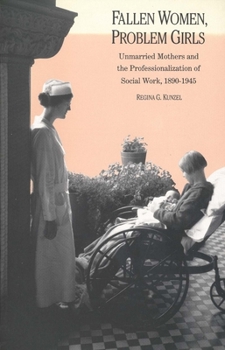Fallen Women, Problem Girls: Unmarried Mothers and the Professionalization of Social Work, 1890-1945
(Part of the Yale Historical Publications Series Series)
Select Format
Select Condition 
Book Overview
During the first half of the twentieth century, out-of-wedlock pregnancy came to be seen as one of the most urgent and compelling problems of the day. The effort to define its meaning fueled a struggle among three groups of women: evangelical reformers who regarded unmarried mothers as fallen sisters to be saved, a new generation of social workers who viewed them as problem girls to be treated, and unmarried mothers themselves. Drawing on previously...
Format:Paperback
Language:English
ISBN:0300065094
ISBN13:9780300065091
Release Date:August 1995
Publisher:Yale University Press
Length:276 Pages
Weight:1.02 lbs.
Dimensions:0.8" x 6.0" x 9.1"
Customer Reviews
1 rating
Touchy topic
Published by Thriftbooks.com User , 20 years ago
Summarizing Regina Kunzel's thesis in "Fallen Women, Problem Girls: Unmarried Mothers and the Professionalization of Social Work, 1890-1945" is not an easy proposition due to the complexity of her arguments. In fact, the title of the book only describes part of the story. The author traces the importance of three female elements within the confines of institutions devoted to caring for out of wedlock mothers. The first element describes the importance of the Protestant women--Kunzel calls them evangelicals--who founded and managed a chain of homes for unmarried women in the late nineteenth century. A second element, the social workers, begins to enter the picture in a big way after the turn of the century. Finally, Kunzel studies the actions of the mothers living within these homes. Relying on a variety of sources--including letters, case files, professional journals, and the records from the various homes--the author finds that facilities for unmarried women helped shape the identities of all three groups in important ways. She goes even further by claiming that homes for unmarried mothers served as a nexus for gender, race, and class issues prevalent in the wider society. Kunzel starts her book with an examination of the evangelical women involved in the Salvation Army and the Florence Crittenton Mission, two of the largest Protestant organized shelters for out of wedlock mothers. The women behind these first efforts to help single mothers practiced a form of "benevolent" care that "promoted sisterly bonds across lines of class and reputation, and promised to redeem "fallen women" through domesticity, religion, and womanly sympathy" (35). These female workers relied on a theory of "seducement and abandonment," which almost always placed the blame for illegitimacy on men, to raise funds and to explain away behavior that society universally condemned. Protestant women believed that keeping the mother and the child together would achieve the purpose of building families, an idea of central importance in the nineteenth and early twentieth centuries. Social workers, most of whom were women trained in professional schools, made serious inroads into the Protestant homes after the turn of the century. Kunzel argues that these new professionals approached unmarried mothers with a cool objectivity that directly opposed the emotionally based care practiced by the evangelicals. Scientific methodologies bolstered by the collection of quantifiable data formed the core of the new gospel preached by the social workers, and the history of professional social work inside evangelical homes is in part a history of conflict between these two groups of women. Seducement and abandonment as causes of illegitimacy went by the wayside, replaced with questionable psychiatric theories that on the one hand labeled lower class women "feebleminded" and "sexual delinquents" while calling middle class white single mothers "neurotic." In other words, social workers not only






